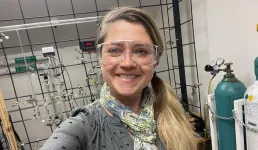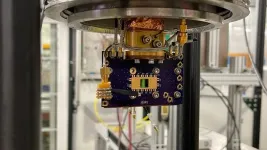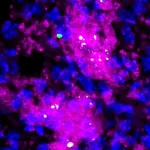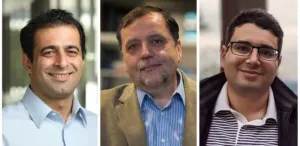(Press-News.org) February 11, 2025, Mountain View, CA -- The SETI Institute awarded the first Frank Drake Postdoctoral Fellowship to Dr. Anastasia Yanchilina. Yanchilina will focus on distinguishing biosignatures from false positives across space and time. Her research combines experimental and analytical research to refine biosignature detection techniques. She will conduct lab experiments to generate key mineral analogs and study Earth’s extreme environments to understand what potential signs of life to look for on other planets.
“It has long been my scientific dream to explore whether life exists beyond Earth and what it may look like,” said Yanchilina. “I am deeply honored to join the SETI Institute as a Frank Drake Postdoctoral Fellow. This fellowship offers an extraordinary opportunity to advance my scientific career and contribute to our search for biosignatures.”
Yanchilina is particularly interested in Ocean Worlds in our solar system. She seeks to produce mineral samples in the lab that will mimic features we may observe near locations of hydrothermal vents that could form in the extraterrestrial oceans of Enceladus and Europa and could have formed in hydrothermal settings on ancient Mars.
Yanchilina has a PhD in Earth and Environmental Sciences from Columbia University and conducted postdoctoral research at the Weizmann Institute of Science, exploring the formation of deep-sea cherts. She also contributed to innovative spectroscopy technology for deep ocean and deep space applications at Impossible Sensing, LLC, and furthered her research at the California Institute of Technology.
“The search for life beyond Earth is one of the most profound scientific endeavors of our time, and the Frank Drake Fellowship embodies the spirit of exploration and discovery that Frank Drake championed,” said Dr. Nathalie Cabrol, Director of the Carl Sagan Center at the SETI Institute. “We are thrilled to welcome Anastasia as our first fellow. Her innovative approach to biosignature detection and her dedication to understanding the conditions that could support life on other worlds will push the boundaries of our knowledge. We look forward to the impact of her research in shaping the future of astrobiology.”
The Frank Drake Postdoctoral Fellowship offers early-career scientists a unique opportunity to make impactful contributions across the diverse fields of the Drake Equation, including Astronomy & Astrophysics, Astrobiology, Environmental Science, Geoscience, Life Science, Planetary Science, Planetary and Space Exploration, Cognitive Science, Biosignature and Technosignature Detection, Computing and Data Science, and Epistemology—fostering new intellectual frameworks for the search for life.
The Fellowship will accept applications annually – the selection process for the 2025 fellowship is underway.
END
SETI Institute names first Frank Drake Postdoctoral Fellow
Fellowship will drive Innovation in the search for life beyond Earth
2025-02-11
ELSE PRESS RELEASES FROM THIS DATE:
From photons to protons: Argonne team makes breakthrough in high-energy particle detection
2025-02-11
Particle detectors play a crucial role in our understanding of the fundamental building blocks of the universe. They allow scientists to study the behavior and properties of the particles produced in high-energy collisions. Such particles are boosted to near the speed of light in large accelerators and then smashed into targets or other particles where they are then analyzed with detectors. Traditional detectors, however, lack the needed sensitivity and precision for certain types of research.
Researchers at the U.S. Department of ...
Cancer’s ripple effect may promote blood clot formation in the lungs
2025-02-11
Blood clots form in response to signals from the lungs of cancer patients—not from other organ sites, as previously thought—according to a preclinical study by Weill Cornell Medicine, Memorial Sloan Kettering Cancer Center and University of California San Diego Health. Clots are the second-leading cause of death among cancer patients with advanced disease or aggressive tumors.
While blood clots usually form to stop a wound from bleeding, cancer patients can form clots without injury, plugging up vessels and cutting off circulation to organs. The study, published Feb. 11 in Cell, shows that tumors drive clot formation (thrombosis) by releasing ...
New UVA clinical trial explores AI-powered insulin delivery for better diabetes care
2025-02-11
For people living with Type 1 Diabetes (T1D), keeping blood sugar levels in check is a constant challenge. A new clinical trial at UVA is aiming to simplify diabetes management by testing an innovative AI-powered device designed to improve automated insulin delivery.
The trial is co-led by several School of Data Science faculty, including Assistant Professor of Data Science Heman Shakeri; Boris Kovatchev, founding director of the UVA Center for Diabetes Technology, a professor at the School of Medicine and professor ...
New technology could quash QR code phishing attacks
2025-02-11
The ubiquitous QR (“quick response”) codes that appear on everything from parking pay stations to soda cans and promotional flyers have become an increasingly popular target for cybercriminals to exploit through QR code–based phishing attacks, also known as “quishing.” Bad actors will place phony QR codes that direct smartphone users to enter their sensitive private information in fake websites masquerading as bank websites, parking enforcement offices, or other seemingly ...
Study reveals direct gut-brain communication via vagus nerve
2025-02-11
A new study in an animal model provides direct evidence for the role of the vagus nerve in gut microbiome-brain communication, addressing a critical gap in the field.
The research, led by Kelly G. Jameson while a PhD student in the Hsiao Lab at UCLA, demonstrates a clear causal relationship between gut microbiota and vagal nerve activity.
While the vagus nerve has long been thought to facilitate communication between the gut microbiome—the community of microorganisms living in the intestines—and the brain, direct evidence for this process ...
MSU expert: Using light to hear biology
2025-02-11
Images
Elad Harel is used to shining a light on the mysteries of the natural world.
Working at the cutting-edge of ultrafast spectroscopy — the application of short laser pulses to analyze the dynamics of molecules — the Michigan State University associate professor’s research aims to reveal how microscopic phenomena impact large complex systems.
One promising frontier Harel has been working on is the development of new methods of microscopy that will allow researchers to observe molecular and atomic landscapes in motion rather than through static imagery. Such work has earned Harel MSU’s 2023 ...
“I can’t hear you, I’m too stressed”: Repeated stress in mice reduces sound perception
2025-02-11
After a week of stress, mice show changes in how their brains process sound, reducing how well they perceive loud noises, according to a study published February 11th in the open-access journal PLOS Biology led by Ghattas Bisharat, from the Ben-Gurion University of the Negev in Israel, and colleagues.
Repeated stress has negative impacts on mental health that can go beyond psychiatric disorders. They can also cause changes in how we perceive the world, making us jump at loud noises, or become easily irritated by scratchy sweaters or offensive odors. To understand how repeated stress can impact how the brain processes sensory information, the authors ...
Chronic stress affects how brain processes sound in mice
2025-02-11
BEER-SHEVA, Israel, February 11, 2025 – Chronic stress changes the way our brain processes sounds, according to new research conducted on mice at Ben-Gurion University of the Negev. For instance, sounds need to be louder during chronic stress to trigger similar responses.
Chronic stress is known to impact learning and decision-making, but could it also affect how we hear? Dr. Jennifer Resnik from Ben-Gurion University’s Department of Life Sciences set out to find whether stress influences basic brain functions, ...
Insilico Medicine announces developmental candidate benchmarks and timelines for novel therapeutics discovered using generative AI
2025-02-11
Cambridge, MA – Insilico Medicine ( “Insilico”) , a clinical stage generative artificial intelligence (AI)-driven biotechnology company today announced a set of preclinical drug discovery benchmarks from the 22 developmental candidate nominations achieved by its platform from 2021 to 2024. These benchmarks underscore the platform's efficiency and represent a potential new standard for the drug discovery industry by significantly reducing developmental times, cost, and by allowing resources to be redirected toward further ...
A wealth of evidence: PIK compiles 85,000 individual studies about climate policy
2025-02-11
“Rather than directly providing answers to questions about the effects of climate policies, this study displays an overview of what has actually been scientifically studied so far,” explains Max Callaghan, PIK researcher and lead author of the study. “On the one hand, this informs existing gaps and thus directions for primary research, including through funding. On the other hand, this overview facilitates evidence synthesis work, i.e. the summarisation of the state of knowledge for governments, for example in the IPCC Assessment Reports.”
The study shows, among other ...
LAST 30 PRESS RELEASES:
Evidence behind intermittent fasting for weight loss fails to match hype
How AI tools like DeepSeek are transforming emotional and mental health care of Chinese youth
Study finds link between sugary drinks and anxiety in young people
Scientists show how to predict world’s deadly scorpion hotspots
ASU researchers to lead AAAS panel on water insecurity in the United States
ASU professor Anne Stone to present at AAAS Conference in Phoenix on ancient origins of modern disease
Proposals for exploring viruses and skin as the next experimental quantum frontiers share US$30,000 science award
ASU researchers showcase scalable tech solutions for older adults living alone with cognitive decline at AAAS 2026
Scientists identify smooth regional trends in fruit fly survival strategies
Antipathy toward snakes? Your parents likely talked you into that at an early age
Sylvester Cancer Tip Sheet for Feb. 2026
Online exposure to medical misinformation concentrated among older adults
Telehealth improves access to genetic services for adult survivors of childhood cancers
Outdated mortality benchmarks risk missing early signs of famine and delay recognizing mass starvation
Newly discovered bacterium converts carbon dioxide into chemicals using electricity
Flipping and reversing mini-proteins could improve disease treatment
Scientists reveal major hidden source of atmospheric nitrogen pollution in fragile lake basin
Biochar emerges as a powerful tool for soil carbon neutrality and climate mitigation
Tiny cell messengers show big promise for safer protein and gene delivery
AMS releases statement regarding the decision to rescind EPA’s 2009 Endangerment Finding
Parents’ alcohol and drug use influences their children’s consumption, research shows
Modular assembly of chiral nitrogen-bridged rings achieved by palladium-catalyzed diastereoselective and enantioselective cascade cyclization reactions
Promoting civic engagement
AMS Science Preview: Hurricane slowdown, school snow days
Deforestation in the Amazon raises the surface temperature by 3 °C during the dry season
Model more accurately maps the impact of frost on corn crops
How did humans develop sharp vision? Lab-grown retinas show likely answer
Sour grapes? Taste, experience of sour foods depends on individual consumer
At AAAS, professor Krystal Tsosie argues the future of science must be Indigenous-led
From the lab to the living room: Decoding Parkinson’s patients movements in the real world
[Press-News.org] SETI Institute names first Frank Drake Postdoctoral FellowFellowship will drive Innovation in the search for life beyond Earth






